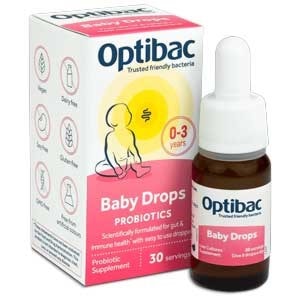Best probiotics for colic and reflux in babies
As any exhausted parent knows, having a colicky baby is both distressing and worrying. If your baby suffers with colic, you’ll be familiar with inconsolable crying, gas, fussiness and screams of pain. A growing area of interest is the role of the gut microbiome, and many parents and carers are considering the use of probiotics for colic. You can read more about probiotics in Dr Kate's article Baby Probiotics.
In this article we discuss:
- How probiotics help with colic?
- Which are the best strains of probiotic to use?
- Whether probiotics can make colic worse?
- How to choose the best probiotic for colic?
The exact reason why some babies develop colic and reflux remains relatively unknown, however, growing evidence suggests that gut bacteria could play a role. Babies with colic may have lower levels of beneficial bacteria and higher levels of inflammation and these combined can cause digestive issues, including colic and reflux1.
Having lots of the right bacteria in your baby’s gut is very important on many levels. The prenatal environment, delivery method and genetics can all shape the baby’s gut, it is also suggested that probiotics play a key factor in physical, cognitive, social and emotional development2.
Recent research for baby probiotics suggests that certain strains of beneficial bacteria particularly Bifidobacterium, have been shown to reduce the symptoms often associated with colic3.
Please be reassured that as a parent you have done nothing wrong and you have not caused the colic; it is a very common complaint in infants.
How can probiotics help with colic and reflux?
The diversity of your baby’s gut health (child microbiome) is instrumental in having a happy and healthy baby. Probiotics, also known as live cultures, are microorganisms which are beneficial to health and help support digestive issues which can cause crying and fussing4. If you would like to find out exactly how they can benefit your baby’s health please see How do probiotics work?.
Not all probiotics are the same. There are specific probiotics designed for babies with evidence suggesting they can help relieve symptoms of colic and reflux by5,11:
- Supporting the diversity of your baby's gut (the more diverse the less colicky)
- Reducing susceptibility to pathogens (harmful microbes), such as E. coli and Klebsiella spp.
- Having an anti-inflammatory effect on the gut, which may decrease symptoms associated with colic and reflux
When you give your baby the correct strain of probiotic, you are helping to create a diverse and healthy microbiome which will help to develop the digestive and immune system.

Which are the best probiotic strains for colic and reflux?
We recommend finding probiotics which contain strains that have been researched in infants and babies, specifically for symptoms associated with colic and reflux.
Some of the best probiotics for babies include:
- Bifidobacterium breve M-16V® was shown to discourage the growth of pathogens (bugs) associated with colic, help colonisation of the infant's gut with healthy bacteria, whilst reducing gastrointestinal symptoms such as colic and reflux6.
- Lactobacillus rhamnosus GG® was shown to reduce crying associated with colic and reflux symptoms whilst also helping with gastrointestinal infections7
Do probiotics make colic worse?
Probiotics do not have any expected side effects, however, it is important to choose the right probiotics for use in babies, to help relieve the symptoms of colic and reflux.
Some research suggests Lactobacillus reuteri DSM 179388 showed mixed results when looking at an improvement of symptoms relating to colic. Although this strain did not help relieve the duration of crying and fussiness which are common symptoms associated with a colicky baby, it is beneficial for managing diarrhoeal disease in children9. Highlighting again the importance of looking for specific strains which have demonstrated a positive outcome for babies suffering from colic and reflux symptoms.
The microbiome of adults and babies are significantly different. When babies are born one of the first natural bacterial colonisers is Bifidobacterium, however, evidence and research suggest that babies suffering from colic and reflux often have lower levels of this bacteria in their gut.
The infant gut, like adults, is influenced greatly by their diet, environment, and medication such as antibiotics. It is these factors (and others) that can influence a baby's susceptibility in developing gut issues.
How to pick the best probiotics for babies with colic and reflux
When you are feeling tired and overwhelmed it can be difficult to make informed health decisions. Any parent looking to find a natural solution to their baby’s discomfort wants to know that it’s safe for their baby and based on sound clinical research.
When choosing a supplement for your baby's colic, I suggest following these two simple steps:
- Pick strains that have been featured in gold-standard clinical trials and demonstrated to be safe and effective for use in babies and children.
- Choose liquid probiotic drops they are much easier to administer to an unsettled baby (and easier for a stressed-out mum or dad). They are safe for short- or long-term use, suitable for formula-fed or breastfed babies and can also be used alongside medicines for colic.
The best probiotic will be one that has robust research for supporting infant health. I like world-renowned B.breve M-16V® strain because it has positive and extensive research for supporting the baby microbiome11 . It can be found in the award-winning high-quality friendly bacteria liquid drop supplement Optibac Probiotics Baby Drops.

When you pick the right strain, not only can it help to relieve digestive symptoms associated with colic and reflux, but it also sets the foundation for a strong, happy, and healthy baby.
If you would like to find out ways to support your child's health, you can learn more in the following articles:
Children's Immunity: Our Top Tips
Probiotics and Children's Immunity
Health professionals seeking more information on clinical research and further resources regarding probiotics and strain specificity, please head over to the individual strain entries on the Probiotics Database.
References
- Dubois N et al., (2016). Characterising the intestinal microbiome in infantile colic: findings based on an integrative review of the literature. Biological Research for Nursing. 0 (3), 18
- Cazzola M. et al., (2010). Efficacy of a synbiotic supplementation in the prevention of common diseases in children: a randomized, double-blind, placebo-controlled pilot study’. Therapeutic Advances in Respiratory. 0 (0), 1-8.
- Tamburini, S. et al., (2016). The microbiome in early life: implications for health outcomes. Nature Medicine. 22 (7), 713-722.
- Pärtty, A. et al., (2013). Effects of early prebiotic and probiotic supplementation on development of gut microbiota and fussing and crying in preterm infants: A randomized, double-blind, placebo-controlled trial. J. Pediatr. 163 (0), 1272-1277.
- Pärtty, A. et al., (2018). Probiotics on Pediatric Functional Gastrointestinal Disorders. Nutrients. 10 (12), 1836.
- Wong B et al., (2019). Exploring the Science behind Bifidobacterium breve M-16V in infant health. Nutrients. 0 (8), 11.
- Szajewska, H et al., (2020). Health benefits of Lactobacillus rhamnosus GG and Bifidobacterium animalis subspecies lactis BB-12 in children. Postgraduate Medicine. 132 (5), 441-451.
- Sung, V et al., (2014). Treating infant colic with the probiotic Lactobacillus reuteri: double-blind, placebo-controlled randomised trial. BLJ. 0 (348), 2107.
- M.urbanska et al., (2016). Systematic review with meta‐analysis: Lactobacillus reuteri DSM 17938 for diarrhoeal diseases in children. Alimentary Pharmacology and Therapeutics. 43 (11), 1025-1034.
- Christine F Favier et al., (2003). Development of bacterial and bifidobacterial communities in faeces of newborn babies. Anaerobe. 9 (5), 219-229.
- Pereira A, Rodrigues J, Albergaria M (2022) Effectiveness of probiotics for the treatment of infantile colic. Australian Journal of General Practice, 51(8):573-576.
- Boggio Marzet, Burgos F, Del Compare M, Gerold I, et al. (2022) Approach to probiotics in pediatrics: the role of Lactobacillus rhamnosus GG. Arch Argent Pediatr 2022;120(1):e1-e7.
- Zakharova I.N., Berezhnaya I.V., Skorobogatova E.V. (2022) Fermented milk-based baby drinks fortified by prebiotics and probiotics: impact on the health of infants and young children. Russian Journal of Woman and Child Health. 2022;5(3):253–261 (in Russ.). DOI: 10.32364/2618-8430-2022-5-3-253-261.
- Carpay NC, Kamphorst K, de Meij TGJ, Daams JG, Vlieger AM, van Elburg RM (2022) Microbial effects of prebiotics, probiotics and synbiotics after Caesarean section or exposure to antibiotics in the first week of life: A systematic review. PLoS ONE 17(11): e0277405. https://doi.org/10.1371/journal.pone.0277405
Popular Articles
View all Children's Health articles-
Children's Health06 Dec 2023

